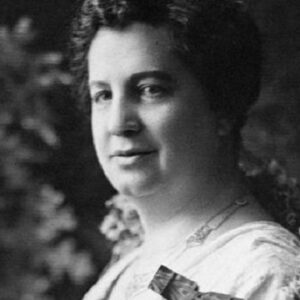Emily Murphy was a writer and activist for women’s rights in Canada. She later became the first woman judge in Canada and the British Empire. Emily Murphy was one of the “Valiant Five” or “Famous Five,” a group of Canadian activists that included other well-known activists like Henrietta Muir Edwards, Irene Parlby, Louise McKinney, and Nellie McClung. She was known for her contributions to feminism in her country. She is known as one of the few women in her time who led the way in getting rid of laws that treated women unfairly. Emily Murphy was born into a liberal family with a lot of ties to politics and the law. Her father believed that sons and daughters should be treated the same. Her maternal grandfather was a politician, and two of her uncles were Supreme Court justices and senators. This is how she was raised, and it helped her understand and talk about issues that hurt women and children in public as an adult. “Nothing ever happens by chance; everything is pushed from behind,” is one of her most famous sayings.
Childhood & Early Life
Emily Murphy was born in Cookstown, Canada, on March 14, 1868, to Isaac Ferguson and Emily Ferguson. She was the couple’s third child. Her older brothers were named Thomas and Gowan. Emily’s dad worked in business.
Emily Murphy went to the Bishop Strachan School in Toronto, which is a private school for girls. People say that her private formal education did a lot to shape her ideas and give her a broad view of life.
Emily Murphy’s Career
Emily Murphy was born into a family with a lot of power in politics and law, so she became a lawyer and teacher at a very young age. Her goal was to help women and children become more powerful.
Between 1900 and 1906, Emily Murphy started writing and used the pen name Janey Canunk to publish her travel sketches.
In 1907, she moved to Edmonton, Alberta, with her family. Here, she put together groups of women and met with them regularly to talk about different problems related to gender inequality.
Emily Murphy started a campaign to protect married women’s property rights after hearing about a woman in Alberta who lost all of her lands when her husband sold their farm. In 1916, the Alberta legislature passed the Dower Act, which gave married women the right to one-third of their husband’s property. This win made her more well-known in the public eye.
Emily Murphy and other activists wanted to see the trials of some women who were accused of prostitution in 1916. But Murphy and other female activists were not allowed to watch the trial because it was thought to be inappropriate. Murphy thought it was unfair that women who worked as prostitutes were only tried in front of men.
She told the provincial Attorney General that this was wrong and made a strong case that women should be tried by a woman judge. Her request was granted, and in the same year, she became the first woman in the British Empire to be a police magistrate.
Emily Murphy then joined the Equal Franchise League and started a group for rural women called the Federated Women’s Institute. She also worked to get women the right to vote. All provinces except Newfoundland and Quebec gave women the right to vote in provincial elections between 1916 and 1922, except for Newfoundland and Quebec.
In 1917, she started a strong campaign to get women in Canada recognized as “persons” and given the right to be in the Senate. She worked on this campaign with Henrietta Muir Edwards, Irene Parlby, Louise McKinney, and Nellie McClung. Together, they were called the “Famous Five.”
This fight went on for 12 years, and in 1928, the Supreme Court of Canada said that women could not be senators. The “Famous Five” tried to get help from Britain’s Judicial Committee of the Privy Council. On October 18, 1929, the Privy Council said that under the British North America Act, women were considered “persons” and could run for Senate seats.
Emily Murphy wrote about drug abuse in Canada in her book “The Black Candle,” which came out in 1922. She saw it as a problem for law enforcement and changed the way people thought about fighting drugs.
At the beginning of the 20th century, she was a strong supporter of forcing mentally ill people to get sterilized. She thought that mentally ill children were a threat to society and that this was the only way to stop them.
Awards & Achievements
In 2004, Emily Murphy and the other “Famous Five” members were shown on the back of 50 Canadian $50 bills.
In 2009, she and the other members of the “Famous Five” were named “Canada’s first honorary senators” by the Senate.
Personal History and Legacies
Emily Murphy married Arthur Murphy in 1887, and they had four girls: Madeliene, Evelyn, Doris, and Kathleen. Her daughter Doris died young from diphtheria.
Emily Murphy died in Edmonton, Alberta, on October 17, 1933, when she was 65 years old.
Estimated Net worth
Emily Murphy is one of the wealthiest civil rights leaders and is on the list of the most well-known civil rights leaders. Based on what we’ve found on Wikipedia, Forbes, and Business Insider, Emily Murphy’s net worth is about $4 million.


